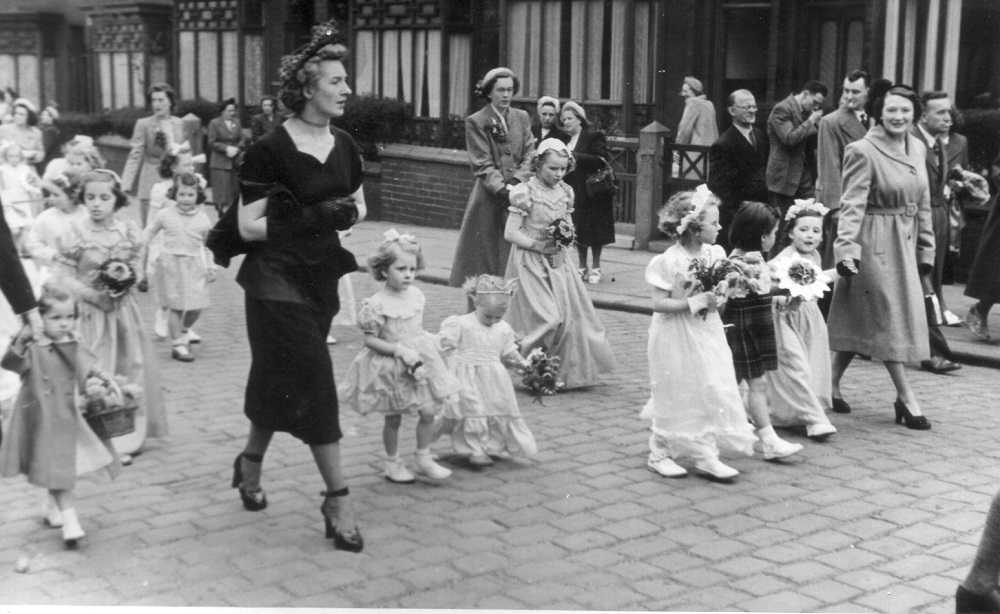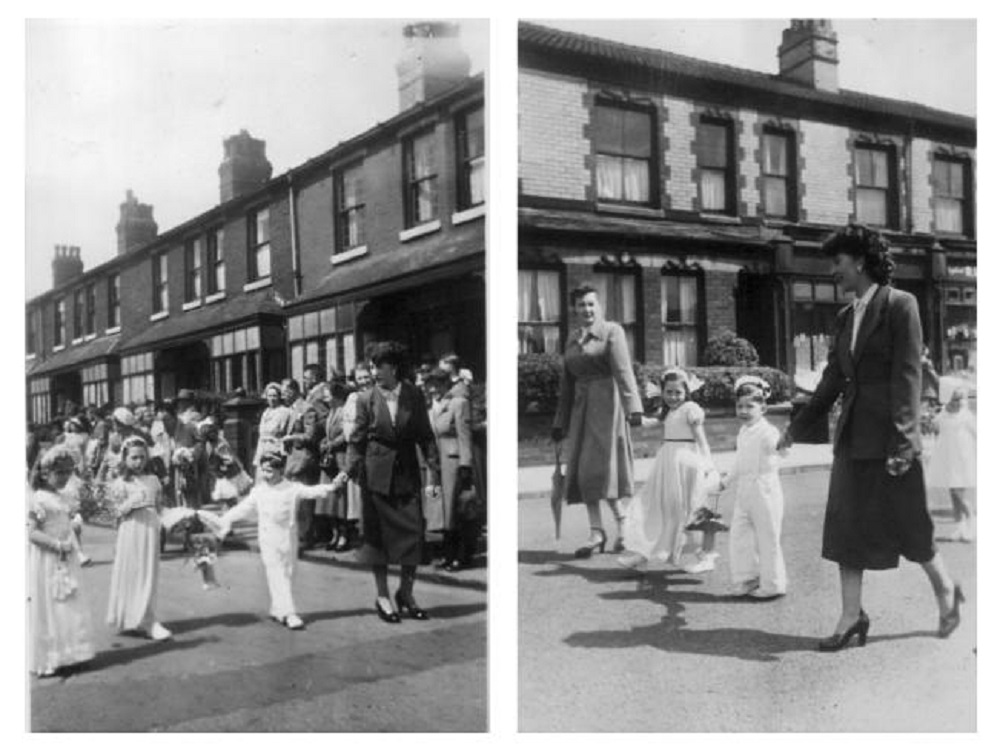Unlike the city centre districts, in Moston the event colloquially known as ‘the scholars’ took place on Whit Sunday.
The pre-war slum clearances had re-located families like ours into better houses in the suburbs, where the churches mainly walked on Whit Sunday. But as Whit Monday and Friday were both Bank Holidays, we Moston children were willing spectators when the old district’s churches processed through the town centre.
It was the tradition for former adult residents of Ancoats or Collyhurst to return and walk with their old Sunday schools. This meant we saw plenty of familiar faces as church after church marched behind a variety of bands. The old township districts were rightly proud of their Sunday schools. From 1784, they had been offering free education to poor children and adults. And until child labour was abolished altogether, Sunday school superintendents and teachers were in the forefront of the battle to achieve safer and healthier working conditions for their scholars.
The old township districts were rightly proud of their Sunday schools. From 1784, they had been offering free education to poor children and adults. And until child labour was abolished altogether, Sunday school superintendents and teachers were in the forefront of the battle to achieve safer and healthier working conditions for their scholars.
When the walks began, around 1800, the long lines of orderly children ranged behind banners, was a visible symbol of the Sunday school movement’s success. The majority of scholars who took part in those early walks would have worked long hours, six days a week, in mills and factories.
On Sunday they earned prizes for good attendance, while being presented with the opportunity of learning to read books that would provide a glimpse into a world outside the slums. Then, at Whitsun, there was the annual Sunday school outing with a picnic tea – a treat which must have been the highspot of a poor child’s year.
At first it was only the protestant denominations who witnessed their Faith by ‘walking’ on Whit Monday. Later the Roman Catholics chose Whit Friday when they also adopted the custom, and all the processions became larger and more lavish. But whatever the day or the location of their particular ‘walks’, to Manchester children, Whitsuntide was synonymous with new clothes.
C & A’s January sales was the place many mothers bought whit week clothes. But it wasn’t unknown for less well off families to resort to a clothing club to ensure their children were well turned out. The dresses girls walked in were showy, but totally impractical for the often damp and chilly Manchester weather. But even when they became available, it was an indulgent parent who allowed a plastic mac to cover up those swanky new clothes for anything less than a torrential down-pour.
The dresses girls walked in were showy, but totally impractical for the often damp and chilly Manchester weather. But even when they became available, it was an indulgent parent who allowed a plastic mac to cover up those swanky new clothes for anything less than a torrential down-pour.
I was one of those unfortunates for whom the night before Whit Sunday was reminiscent of a session with the Spanish Inquisition. On 364 days of the year, I was that skinny girl with the extreme parting and two long, fat plaits. But for some reason known only to my mother, Whit Sunday necessitated ringlets, and that meant a night in what we called ‘sore fingers’.
Before my hair was washed and brushed out, some old cotton material was torn into strips about an inch wide. While the hair was wet it was divided into strands and one of the rags was attached close to the scalp. Next, each strand of hair would be wound into a tight spiral around the rag then the remaining material was wrapped over the hair in the opposite direction to hold it in place. The two ends of the rag were knotted together firmly, leaving my head looking like an inept first aider’s attempt to bandage a badly crushed hand – and was about as painful to sleep with.
Girls’ dresses ranged from white through all the pastel shades. On reaching the assembly point, each colour was sorted and allotted a banner or flower basket with long ribbons attached. The Sunday school teachers clucked about, placing girls at strategic intervals along the ribbons. Boys were grouped into uniformed, grey-shorted or even sailor-suited lines. They mostly walked in single file, sometimes holding on to a fancy cord; woe betide any scholar who didn’t maintain the required distance between themselves and the next child.
Boys were grouped into uniformed, grey-shorted or even sailor-suited lines. They mostly walked in single file, sometimes holding on to a fancy cord; woe betide any scholar who didn’t maintain the required distance between themselves and the next child.
Pre-school age children walked holding the hand of an adult who might be called on to carry them if they got too tired to complete the whole distance. At the designated time, one of the local Silver or Brass bands struck up a hymn tune, and we followed, accompanied by our parents who kept pace with the procession on the pavement.
Then, suddenly, the music stopped and it was the end of walks and ringlets for another year.